Colorectal cancer diagnosis: All about colonoscopy
Written in association with:When diagnosing colorectal cancer, a colonoscopy plays a pivotal role. If you or someone you know has suspected colorectal cancer, this article aims to provide essential information about colonoscopies.
Leading consultant colorectal surgeon Mr Arun Shanmuganandan addresses questions that may help you understand this diagnostic procedure.

What is a colonoscopy?
A colonoscopy is a medical procedure used to examine the inner lining of the large intestine (colon and rectum). It involves the use of a flexible tube with a tiny camera, known as a colonoscope, which is inserted through the rectum into the colon. This allows doctors to visually inspect the colon for abnormalities, including signs of colorectal cancer.
Why is a colonoscopy necessary?
A colonoscopy is essential for several reasons, primarily:
Detecting colorectal cancer
It’s one of the most effective methods for early detection of colorectal cancer. Detecting cancer in its early stages significantly increases the chances of successful treatment.
Screening for precancerous growths
Colonoscopies can identify and remove polyps (small growths on the colon lining) that can potentially develop into cancer if left untreated.
Diagnosing gastrointestinal conditions
Beyond cancer detection, colonoscopies can help diagnose various gastrointestinal conditions, such as inflammatory bowel diseases (IBD), diverticular disease and chronic digestive issues.
When should you consider a colonoscopy?
The timing of a colonoscopy depends on your risk factors and medical history. However, some general guidelines include:
Age
In the UK, routine screening colonoscopies are usually recommended starting at age 50 for individuals with no family history of colorectal cancer. If you have a family history, your doctor may recommend earlier screenings.
Symptoms
If you are experiencing symptoms such as rectal bleeding, unexplained weight loss, anaemia, changes in bowel habits or persistent abdominal pain, your doctor may recommend a colonoscopy to investigate the cause.
Follow-Up
If you've had a previous colonoscopy that revealed polyps or other issues, your doctor may schedule regular follow-up colonoscopies to monitor your condition.
What can I expect during a colonoscopy?
Preparation
Before the procedure, you will need to follow a specific diet and cleansing routine to ensure your colon is empty and clear for examination. Your healthcare provider will provide detailed instructions on how to prepare for the colonoscopy.

The Procedure
During the colonoscopy
- You will be given sedation or anaesthesia to keep you comfortable and relaxed.
- The colonoscope is gently inserted through your rectum and gradually advanced through your colon.
- The camera on the colonoscope transmits images to a monitor, allowing the doctor to carefully examine the colon's lining.
- If any polyps or abnormalities are found, they may be removed or biopsied during the procedure.
After the procedure
You may experience some gas and mild discomfort after the colonoscopy, but this typically subsides quickly. You'll be monitored until you're fully awake and can safely go home.
Is a colonoscopy safe?
Colonoscopy is generally considered a safe procedure. However, like any medical procedure, there are some risks involved. These risks include bleeding, perforation of the colon (a rare complication), and adverse reactions to sedation or anaesthesia. Your healthcare provider will discuss these risks with you before the procedure.
How long does a colonoscopy take?
The duration of a colonoscopy can vary but typically takes about 30 minutes to an hour. However, the entire process, including preparation and recovery, may take several hours.
What happens if abnormalities are detected?
If the doctor finds any abnormalities during the colonoscopy, they may take biopsies or remove polyps for further evaluation. These samples are sent to a laboratory for analysis. Depending on the results, your doctor will discuss treatment options and further diagnostic tests if necessary.
Conclusion
A colonoscopy is a crucial diagnostic tool in the battle against colorectal cancer. If you have concerns about your colorectal health or have risk factors, don't hesitate to discuss the possibility of a colonoscopy with your healthcare provider. Early detection and treatment can make a significant difference in outcomes, and this procedure could be a vital step in safeguarding your health.
Remember that this article provides general information about colonoscopies. Your healthcare provider will offer personalized advice based on your unique medical history and circumstances. If you suspect colorectal cancer or have concerns, always consult with a healthcare professional for guidance tailored to your specific situation.
If you require medical attention regarding colorectal conditions, including colorectal cancer, arrange a consultation with Mr Shanmuganandan via his Top Doctors profile.


